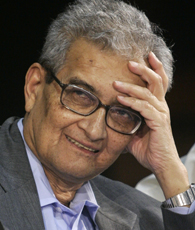Economist and philosopher Amartya Sen has been called the “Mother Teresa of economics” for helping improve the lives on the poor through his work in welfare economics and the study of famines.
Brief Biography of Amartya Sen
As a child, Amartya Sen lived through the 1943 Bengal famine in India. In his breakthrough 1981 book “Poverty and Famines,” Sen found that the famine was caused not by a lack of food, but because certain lower-class groups lacked the financial means to purchase food.
His work has influenced the way in which governments and international organizations respond to famines and determine a people’s standard of living. Furthermore, he has found that famines do not take place in functioning democracies, and reasoned that social reforms and political freedom promote economic growth.
“Sen is special because he is the first economist-philosopher whose work has consciously touched the lives of millions of the poorest people in the world,” writes Meghnad Desai, professor emeritus at the London School of Economics, in Time magazine.
Sen was awarded the Nobel Prize Economic Sciences in 1998 “for his contributions to welfare economics.”
Amartya Sen Resources
Sen recounts his life in an 8,500-word autobiography he wrote for the Nobel Foundation.
Encyclopedia Britannica provides an overview of Sen’s life and work.
Jonathan Steele of The Guardian offers a critical look at Sen’s published works.
Sen has contributed more than a dozen essays to The New York Review of Books over the last three decades.
Interviews With Amartya Sen
Discussing his early life, his work and his philosophies with Harry Kreisler of UC Berkeley’s Institute of International Studies, May 2005.
Discussing multiculturalism and identity politics with Indian-born British author Salman Rushdie at the New York Public Library, April 30, 2006
Discussing the importance of universal education with Mishal Husain of PBS’ “Wide Angle,” Sept. 4, 2003
Discussing his 1999 book “Development as Freedom” with Akash Kapur of The Atlantic, December 1999.
The Man and His Work
- “Poverty and Famines: An Essay on Entitlement and Deprivation”
- “Inequality Reexamined”
- “Development as Freedom”
- “Rationality and Freedom”
- “The Argumentative Indian: Writings on Indian History, Culture and Identity”
- “The Idea of Justice”











